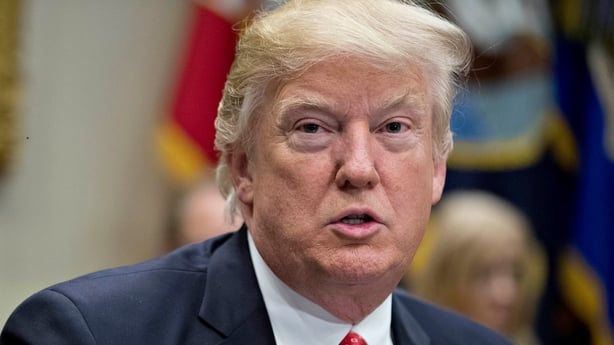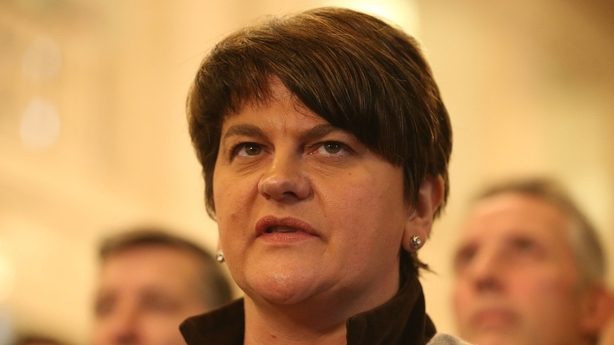There is a very funny 1979 movie called 'Being There' in which Peter Sellers plays Chance, a simple-minded gardener, who through a series of most unlikely events becomes a very trusted adviser to the president of the United States and (unknown to Chance), even closer to the president's wife, played by Shirley McLaine.
Two months ago Donald Trump went a significant step further than Chance, the gardener. A businessman with no previous experience in politics but a master of tweeting and fronting a reality television show is now the main man in the White House. Most mainstream broadcast and print media mock him. Opinion polls suggest that, in a sharply divided America, a majority continues to support him. And Wall Street is high-fiving.

Last Monday night, 13 February, Taoiseach Enda Kenny, was in full flow, addressing a gathering in Cork about how Ireland might be affected by Brexit. A comedian took a place near the front of the stage, faced the audience and began playing the role of sign language interpreter.
The previous Friday night, 10 February, I watched the same Taoiseach front another Brexit event at the Sligo Park hotel. He had been in Poland and took the road west from Dublin Airport. The Sligo speech and Q&A session lasted more than two hours.
It was chaired by the Louth Fine Gael TD, Fergus O’Dowd who made several references to his leader’s masterful handling of complex detail. Mr Kenny stayed on for a long time after the formal close of proceedings, chatting to a line of admirers. Many of them were Fine Gael activists who remembered the barren years when Fianna Fáil was the party of government.
Two days after his masterful performance in Sligo, Sunday 12 February, following a brief stop with his family in Castlebar, Mr Kenny sat opposite Colm Ó Mongáin in the RTÉ This Week radio studio. The 65-year-old who keeps fit through regular cycling, seemed breathless. He had been chatting with RTÉ’s new Head of News and Current Affairs, Jon Williams, and almost missed the live slot. The Taoiseach rushed down the RTÉ corridor to the studio.
The interview was dominated by the Garda Sergeant Maurice McCabe affair, described by Mr Kenny as "a most serious matter about one of the most high-profile whistle blowers in the history of the State".
Fifteen minutes in, the Taoiseach was breathing normally when Mr Ó Mongáin posed the question: "Who knew what, when, with regard to this? What did Katherine Zappone tell you and what did her officials tell your officials?"
"Minister Zappone is doing a very good job...did tell me she intended to meet with Sgt McCave...McCabe in a private capacity and, eh, that's all I knew...I said to her...well, if you...if you have a meeting make sure that you have, you know, a thorough account of it...so when we had our meeting on Tuesday I wouldn’t have been aware of the details of her discussions with [McCabe]," said Mr Kenny.
Mr Ó Mongáin: "Did you ask her what the meeting was about?"
"No, because she was meeting him in a private capacity which she is entitled to do," said Mr Kenny.
Two days later, the Dáil was in full flow, debating the fall-out from the Sgt McCabe affair. Mr Kenny was on his feet, looking towards the Fianna Fáil benches, when he made the following remarks: "I might say, mea culpa here, because I did say and...I am guilty here of not giving accurate information...I understood from thinking myself that I had, that she had asked me about meeting Sgt McCabe in the first place. It actually was her office that consulted with my officials who told me...so she...she is very clear that she did not tell me that she intended to meet Sgt McCabe...she did tell her official to tell my office so I...I...I regret that...I regret that...I regret that...I regret that...it is the same information I didn’t actually...I didn’t actually...she didn’t tell me herself that she was meeting Sgt McCabe. She did tell me before the Cabinet meeting last week that she had with met him and that she had discussions the accusations that were false in respect that were given to Tusla."
And the rest is history. Messy history. In the early 90s, Ireland’s Peter Sutherland might have become the president of the European Commission. Jacques Delors had mentored him and admired him: who not an Irishman? Didn’t tiny Luxembourg provide two holders of the office, Jacques Santer and the current occupant, Jean Claude Juncker. But Mr Sutherland didn’t get the bounce. In the same way Mr Kenny could have found his way to Brussels, with a supportive nod from Angela Merkel. But there will no such dream exit from Dáil politics.
We have our own version of Being There up North. In the May 2016 Assembly elections, the DUP’s new leader, Arlene Foster received a strong mandate. Much about her was different - a woman, a former Ulster Unionist, a member of the Church of Ireland - not the Free Presbyterian Church. Like Derry’s Martin McGuinness, she crossed the Bann from Fermanagh, so she had a beyond the Belfast bubble perspective.

Then came Brexit. Then the SDLP, the Ulster Unionists and the Alliance party went into opposition. Then the DUP turned in on itself. Then the Renewable Heat Incentive controversy broke. Then Martin McGuinness became ill. Then Stormont collapsed. Then Michelle O’Neill replaced Martin McGuinness as Sinn Féin’s leader in the Northern Ireland Assembly.
Chance, the gardener, might be wary about offering a view about what might happen next. Even he would be surprised by the cast of characters and the range of issues on centre stage. Truth is stranger than fake news.
Boris Johnson, my old acquaintance from Brussels days, when he was a most colourful Daily Telegraph correspondent, is Britain’s Foreign Secretary. His boss, is Theresa May and her most consistent line, said with a smile, is Brexit means Brexit. The DUP, its confidence in its boots, is looking nervously towards the 2 March Assembly election day. The SDLP, the Ulster Unionists and (to a lesser extent), the Alliance party, pray they won’t be further reduced for being too effective in an opposition role. And Sinn Féin, south and north, are energised by the chaos.
What odds a united Ireland in the not too distant future? A businessman-politician like Donald Trump could anticipate the terms and circumstances of the deal. Brexit as the game changer. The Scots might take their leave of the UK. After a few unhappy years of Direct Rule from Westminster, the conditions might exist to get a border poll over the line and trigger a united Ireland. Exit terms – two years of annual UK subvention to Northern Ireland for every one hundred years of occupation. And try to put the squeeze on Brussels to fork out matching funding.
Yes, there is that small matter of almost one million unionists.
But, as Chance the gardener says in the movie Being There, ‘life is a state of mind.’






